Hotel Etico, where workers living with disabilities are ‘front and centre’
Australia’s first social enterprise hotel – Hotel Etico – is a successful model for training people living with a disability for not just a job in hospitality, but a career. The trainees are ‘front and centre’, challenging the public’s assumptions about what disability and work looks like – and so far, they’ve all found jobs with major luxury hotel chains. Hotel Etico is one of the alumni charities pitching again at the TFN 10th Anniversary event.
As sector leaders call on governments and businesses to employ more people living with a disability, Australia’s first social enterprise hotel is a shining example of how it can be done. Hotel Etico in the Blue Mountains provides a luxury hospitality experience alongside running a training program for employees with disabilities working in all areas of the hotel and restauration operation.
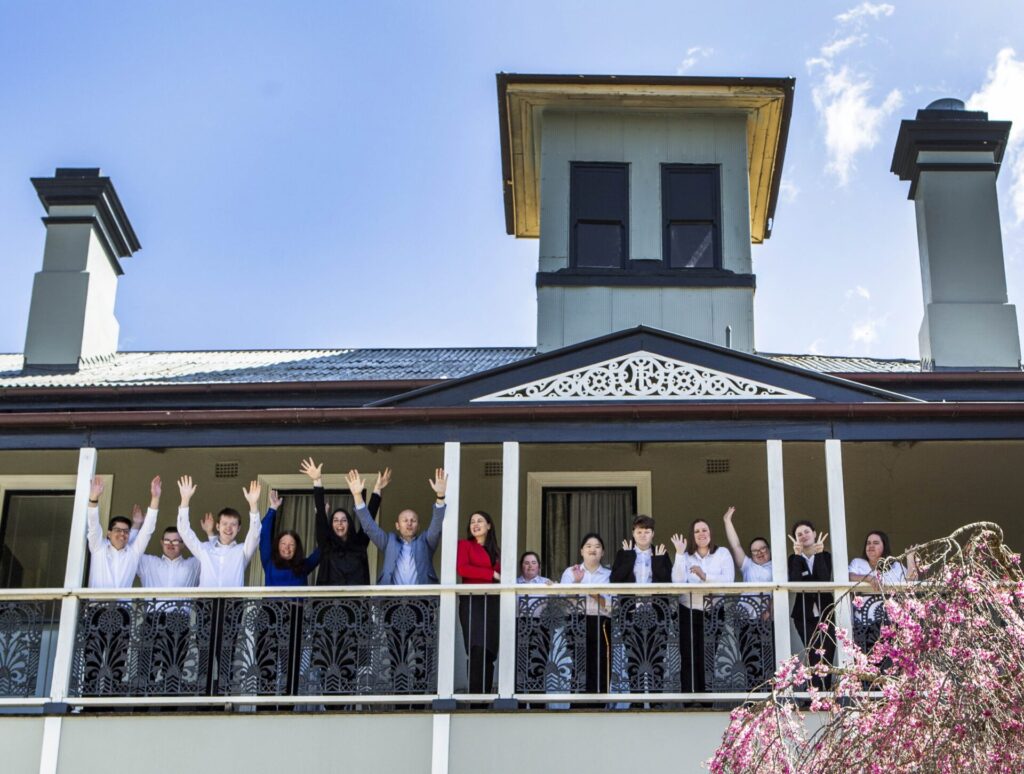
The 16-room hotel is set in the historic Mount Victoria Manor and gardens, a property first built by the Fairfax family in 1876. Based on an Italian model, the Hotel Etico Australia project was established in 2017 by Alex Toselli, Andrea Comastri and Tracylee Arestides, with founding financial and mentoring support from Paul and Sandra Salteri, and co-seed funding from the Vincent Fairfax Family Foundation, along with backing from other funders. The hotel opened its doors in early 2020.
Andrea, now CEO and director, says: “When I first heard about the model in Italy, I just loved the idea. For too many years, there has been an assumption that people with a disability just need to be placed in a job to do something that keeps them busy. What we do differently is give them to the skills, tools and confidence in their own skin to be able to aspire to and achieve a career in hospitality.”
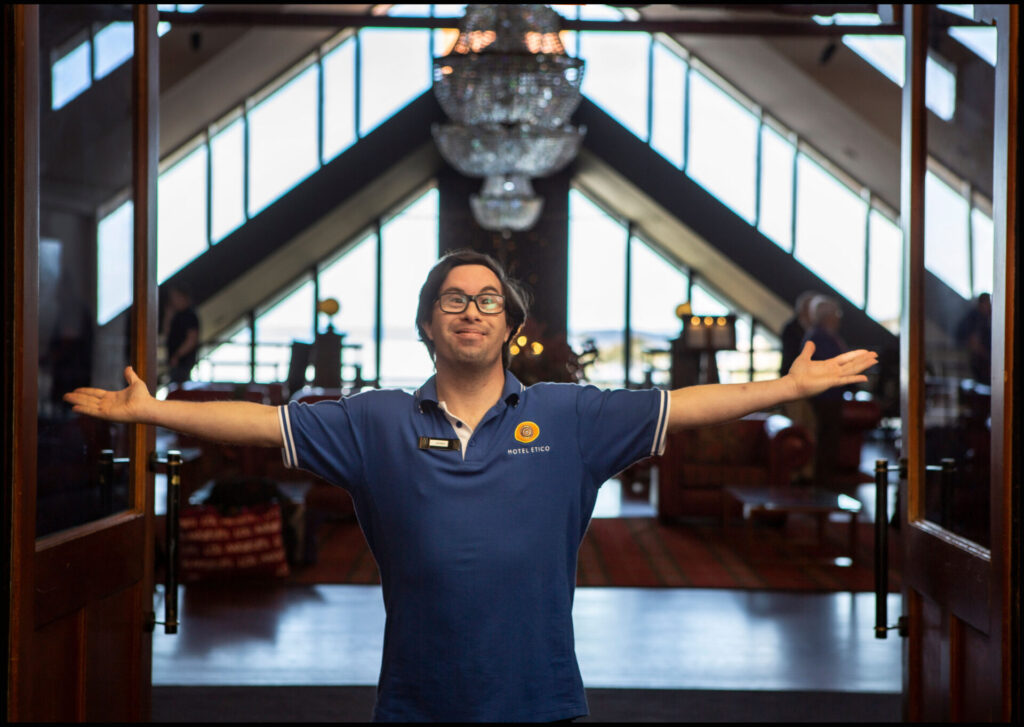
Hotel Etico also secured funding in late 2020 from The Funding Network (TFN) that allowed it to double its intake of trainees from six to 12. The latest intake now numbers 15 trainees. Andrea, who has a background in philanthropy and social enterprise, and his team are one of the alumni organisations that are pitching again at the TFN’s 10th Anniversary event to fund further growth.
In the hotel’s two-year training program, called the Academy of Independence, trainees who are aged between 18 and 35 and have an intellectual, neurodevelopmental or physical disability, work and live onsite for the first year. They learn on-the-job hospitality skills, alongside independent living skills, always with a ratio of 1:3 disability support workers. Hotel Etico is a registered NDIS provider and has developed its own curriculum, which is partly mapped to certificate training but also adapted to a person-centred style.
‘I’m always excited to go to work’
Once the trainees graduate, Hotel Etico helps secure ongoing positions with sector partners and supports them and the employer for another year. So far, all trainees have graduated and all have found ongoing jobs with groups such as Fairmont Resorts, Sofitel, Fullerton and Mercure.
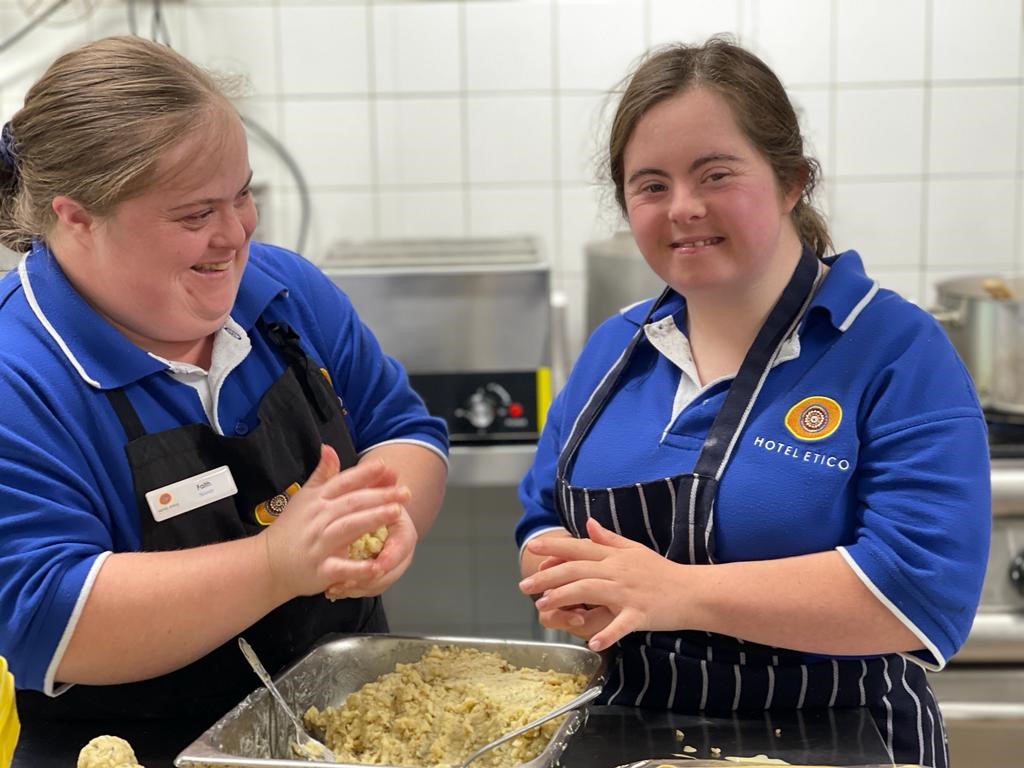
It’s clear the program is making a difference in people’s lives. Trainee Luci says: “My life now is fun and exciting because I love working at Etico and being on the floor. I am always excited to go to work.” Before Luci started her training, she says her life had been “a little bit boring”.
Andrea says that they push trainees far out of their comfort zone. “It’s a supported push, and sometimes it’s two steps forward, one step back, but you can see the journey of a trainee and it’s remarkable. Usually by the six-month mark, they have transformed in confidence and just own the place.”
It’s this perfect balance between learning work and living skills that is at the heart of Hotel Etico. “What the trainees learn on the job is useful at home and what they learn at home is useful on the job. Properly paid work is one of the fundamental keys to independence, to a fulfilled and dignified life. The majority of our trainees have not been employed before and we employ them in full open employment. We pay award wages from day one. That was a big priority.”
The rewards speak for themselves. Bookings are good and feedback from the trainees, their families, onward employers and customers is overwhelmingly positive. “We don’t want people to come to us because we’re a charity. We want people to stay with us because we’re a good hotel, with nice atmosphere and service,” says Andrea.
The social change happens on the restaurant floor
“My favourite pastime is going to the visitor book every week and reading customers’ comments. It’s really heartwarming. My next favourite pastime is being on the restaurant floor on a Friday night and telling customers the story of Hotel Etico and answering their questions. That’s where the social change happens.”

Most of the trainees are living away from home for the first time, which is a significant step for them. The impact extends beyond everything the trainees are learning though, to their families, to the employers supported to develop inclusive practices – and to the community.
“When the public interacts with our trainees, who are front and centre of the business on the restaurant floor, in housekeeping, at reception, it immediately changes their perception about and work and disabilities,” says Andrea.
Hotel Etico, which won the Community section at the Human Rights Awards last year, is also involved in advocacy and systems change. Andrea and his team addressed the federal government’s Jobs and Skills Summit, and says that Hotel Etico is driven to help develop more inclusive workplaces – not just because it’s the right thing to do, but because it makes good business sense too.
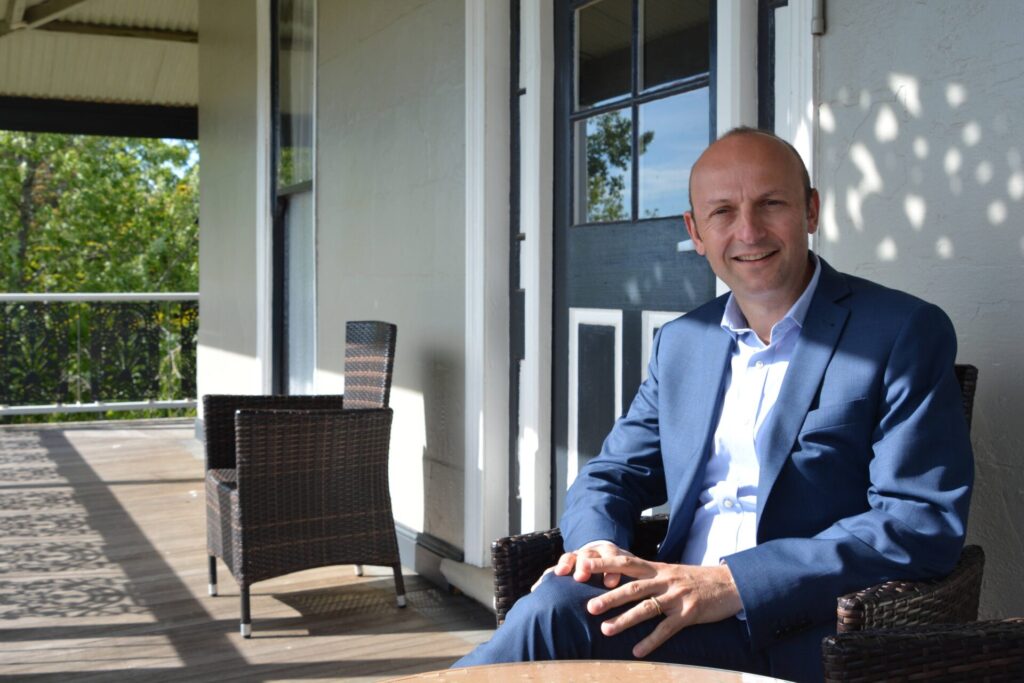
“We want to open people’s minds to the idea that there is value and productivity in a commercial sense to employing someone who is living with a disability. It’s the logical thing to do, especially when the hospitality industry, particularly, is crying out for staff. But the motivation for change needs to come from the top leadership.”
‘Running the training program is the least of our challenges’
The only challenges Andrea mentions are those related to making any hospitality venue successful in today’s market. “Running the disability trainee scheme is the least of our challenges. We’re able to cover 70% of our expenses with commercial and NDIS revenue, which is remarkable for a social enterprise that’s been in business just over two years. Our aim is to get to 85%.”
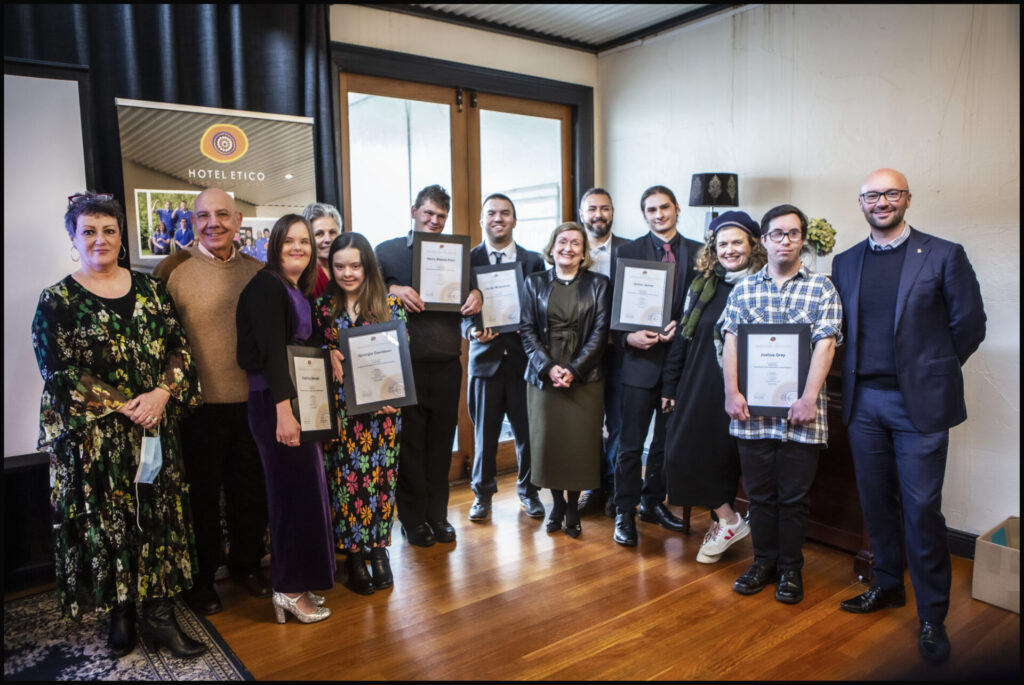
The team’s vision is to expand to every state because statistics show that there is need. Earlier this month leaders in the NDIS employment sector urged governments to boost job participation levels – the unemployment rate of people living with a disability is around twice that as the wider population. Andrea hopes the path towards more inclusive policies will be clearer after the Disability Royal Commission, that has been running since 2019, delivers its final report in September.
The Italian model expanded successfully, so Andrea knows the structure can be replicated, and all key systems are already in place. “Not that many years ago, you would celebrate 15-20% commercial revenue but we’ve turned that on its head. All we need is a little bit of top up from the philanthropic sector. We think we provide a great social return on investment value,” he says.
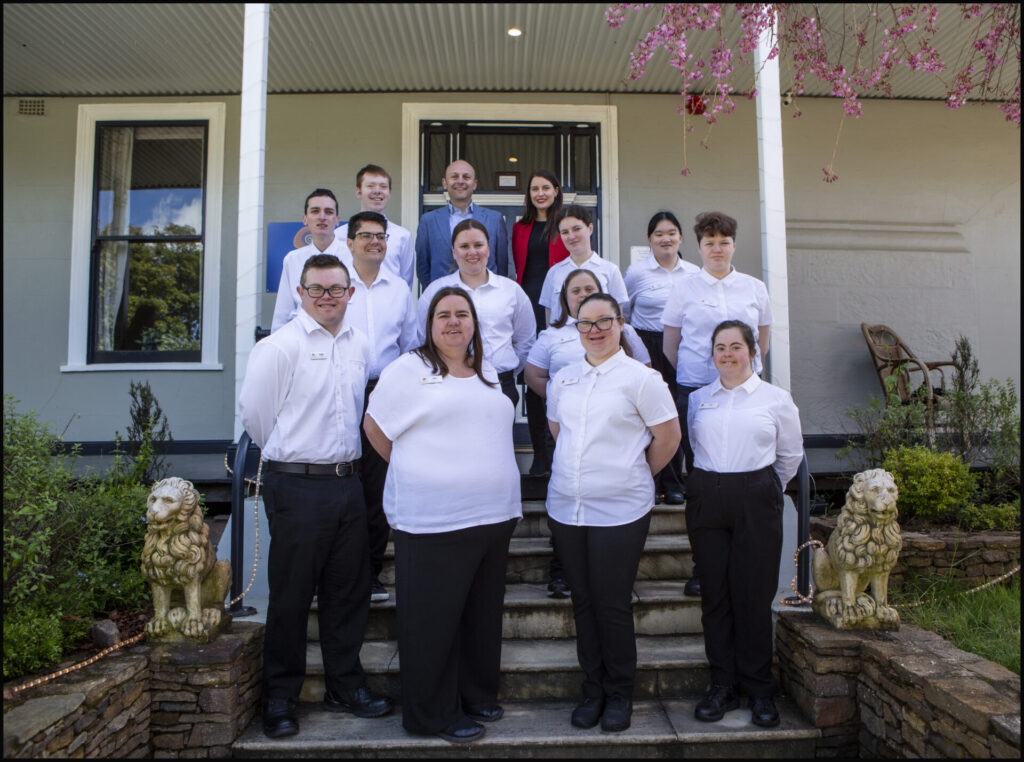
“There’s an opportunity for philanthropy and government to support an innovative model that we know is making a difference.” For now though, he says every day at the hotel is a highlight: “Being on the floor, getting the high-fives and smiles from our trainees, and seeing the transformation in their confidence, that’s the biggest motivator.”
The last word is with Luci. What’s the best thing about Hotel Etico? “It’s working and having fun with my new workmates, who are now great friends – and getting tips!”